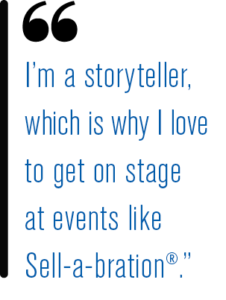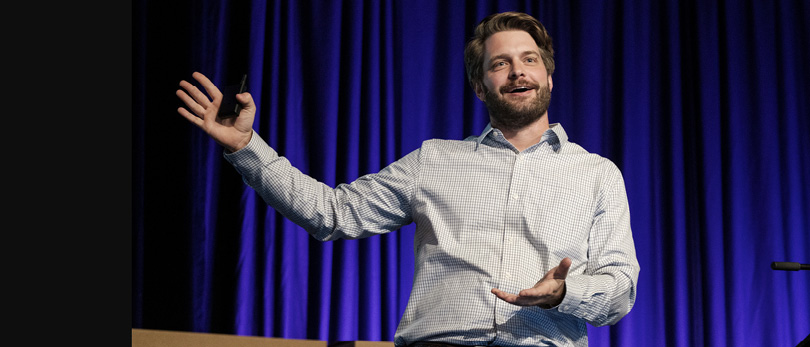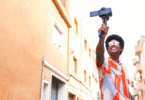Residential Real Estate Council (RRC) spoke with Kyle Scheele, author and Sell-a-bration® Closing Session keynote speaker, about creativity, failure and “going viral.”
RRC: People often think their ideas will go viral. What’s your take on virality?
Scheele: I’ve had tons of things go viral, and I still don’t know how to do it. I always simply say if it’s something you want to do and believe in, put it out in the world. There’s this thing called the Equal Odds Rule. They’ve done studies about it with scientists who publish papers. You have scientists like Einstein, who have breakthrough papers that everyone’s heard of, but they just published a ton of papers. So, any paper from any scientist is just as likely to be famous as any other. Over time, if you put out a lot of content, you’re more likely to get lucky.
Always come up with new ideas and try new things. When something works, try to figure out why that worked. Then, go to the next idea.
RRC: How does success shape (or hinder) your approach to new ideas?
Scheele: I think it’s a combination of both. Even if something is mediocre, I have 3 million followers on TikTok. A mediocre video for me will still get tens of thousands of views, so that’s helpful. It’s also helpful that I have this big audience that knows my work, and it’s more likely to resonate with them. I’m not starting from scratch every time—they’ve seen stuff I’ve done in the past.
Don’t put that pressure on yourself, like everything has to catch up to the last best thing you did. John Green wrote “The Fault in Our Stars,” and he said he had written a long time before he had this massive hit book and movie. Why keep writing? For him, that is the thing he loves to do. He didn’t write to become this international sensation. I try to keep that in mind with my projects. I didn’t think anyone would care about my photoshopped family portrait, and yet it got 68 million hits.
RRC: What do you think about influencers?
Scheele: I’ve had mixed experiences as an influencer. I don’t love the term, and I don’t use it for myself. I’m a creator. I like to make things and put them out there.
Figure out what your goals are. I’ve been a speaker for 14 years now and accidentally became an influencer three or four years ago. I’ve done some cool brand deals, and I can tell stories about things on stage, but if your goals and the products you’re selling don’t line up, then it can be a waste of time for the creator and the brand they represent. For real estate agents, you can end up building a huge audience. But if that audience is not composed of people who will buy real estate from you, did you meet your goal?
RRC: Staying passionate seems central to your work.
Scheele: Absolutely. Pursuing what genuinely interests you is key. Viral success should not overshadow the essence of your brand.
For example, something you see on X (formerly Twitter)—a person, not famous, has a tweet go viral. Then, you notice that the next three or four tweets will be about the products that they are selling. Some brands look for viral tweets and send those people a marketing proposal. If it is the only moment of virality you’re going to have, maybe take the deal. But if it isn’t authentic to your brand goals, it’s a race to the bottom. It dilutes the connection you have with your audience. I never wanted to do that. For me, it has been fun, and I didn’t set out to be an influencer. I was posting on TikTok for fun, and I went from having 17 followers to 1 million followers in 25 hours. I’m a storyteller, which is why I love to get on stage at events like Sell-a-bration®. TikTok is something fun on the side.
RRC: What advice do you have for people who might be hesitant and afraid to fail?
Scheele: First, ask yourself, “What’s the next step?” A big idea can seem overwhelming. Next, ask yourself, “If I’m going to do that, what has to come before it?” Back up the idea with what comes before until you have a place to start. You might need to Google some things or reach out to a friend with knowledge—you aren’t afraid of those tasks because they are low-stress. Take practical steps and you will realize that your idea is more doable than you thought. It helps to alleviate the fear. Finally, you kind of trick yourself. Eventually, you do enough of those tasks where you’re too far in to turn around. So, you may as well keep going.
 I don’t think people are afraid of failure. I think that they’re afraid of being judged for failure. You have to negate the fear. The way I address it is by realizing nobody cares. Nobody’s thinking about your failure. How many times a day are you thinking about someone else’s failure? You aren’t.
I don’t think people are afraid of failure. I think that they’re afraid of being judged for failure. You have to negate the fear. The way I address it is by realizing nobody cares. Nobody’s thinking about your failure. How many times a day are you thinking about someone else’s failure? You aren’t.
Years ago, I put an idea up on Kickstarter. I put all this time and effort into it, and it failed—nobody bought it. Years later, I was having coffee with someone I didn’t know, but I reached out because I liked his work and we lived in the same town. Partway into our conversation, he says, “Oh, I know who you are. You’re the guy who did that Kickstarter.” I immediately started making excuses for it and asked him not to judge me based on that project. And he said he thought it was cool that I put my idea out there. Often we think that people are following everything we do. So, when we fail, we think they see what we see. He just saw that I launched a business and was inspired by that. Remind yourself that the stakes are much lower than you think. When you fail, it isn’t over. You will learn from it and be back at it in no time.
For more from Scheele, visit kylescheele.com and pick up his book, “How to Host a Viking Funeral: The Case of Burning Your Regrets, Chasing Your Crazy Ideas, and Becoming the Person You’re Meant to Be.”








